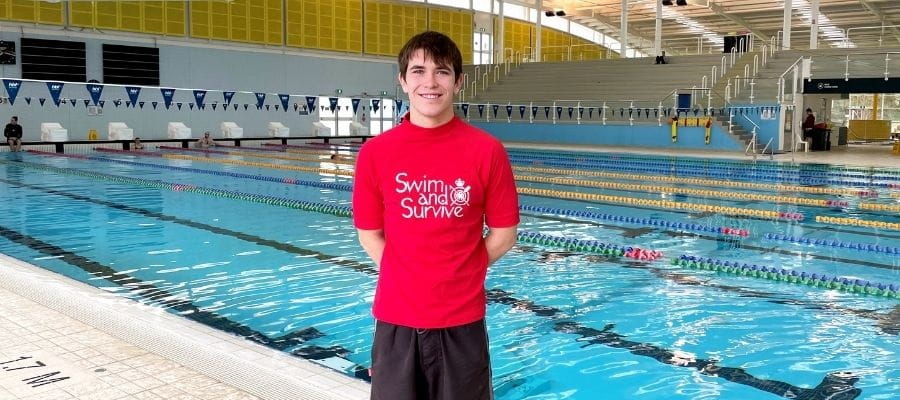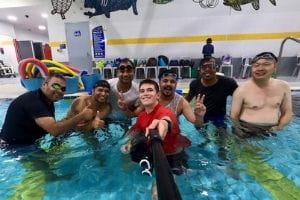
“Teaching multicultural groups has been some of the most rewarding teaching work I’ve done.”
Cyrus Milne is a swimming instructor who is passionate about water safety and teaches a wide variety of students, including adult multicultural groups for Royal Life Saving WA’s multicultural programs.
 Migrant and multicultural communities are over-represented in WA’s drowning statistics, with people born overseas accounting for 39% of all drowning deaths in our state over the past ten years. Many have come from countries where access to a regular swimming education while growing up is rare.
Migrant and multicultural communities are over-represented in WA’s drowning statistics, with people born overseas accounting for 39% of all drowning deaths in our state over the past ten years. Many have come from countries where access to a regular swimming education while growing up is rare.
Royal Life Saving WA is working to address this issue by providing culturally appropriate swimming programs to all communities. Swimming Instructors such as Cyrus have been using their expertise to make a difference by teaching adults vital swimming and water safety skills.
We spoke to Cyrus about his work and what he loves about his role and the people he teaches:
Tell us a little about yourself:
“I am 21 years old, originally from Canada but moved here when I was six years old. I have always loved swimming but when we moved here, and so close to the beach, my parents thought it was best to put me straight into swimming lessons – which of course only grew my passion for the sport!”
What made you decide to become a swimming instructor?
“My decision to become a swimming instructor started when my coach needed help with some afternoon classes teaching primary school kids. I got some great feedback from parents and the kids. I had a parent tell me their son told his therapist that swimming in my afternoon classes was what made him happy. The idea that I was a role model and making a difference in these kids’ lives is what inspired me to keep teaching and expand my skills.
My previous aquatic experience at the time was 3 years of competitive squad swimming under Pauline Pratt, mainly open water swimming. Outside of competition I loved snorkelling, free diving and scuba diving. Now I’ve completed five solo crossings to Rottnest, still competing in open water swims and teaching every day.”
Where do you teach now?
“I’ve been teaching at HBF stadium for almost four years now, with levels ranging from toddlers up to advanced squads. A couple of years ago I got the opportunity to teach squad swimming at my old high school through Royal Life Saving WA and teach the program that got me to where I am now!”
What do you enjoy about teaching multicultural classes?
“Teaching the multicultural groups has been some of the most rewarding teaching work I’ve done. Some of these clients have very real fears of the water or no swim experience at all. To give them the skills to be safe in the water and have fun is extremely rewarding. To know you have made a positive change in their lives is just a fantastic feeling.
Sometimes there can be a little bit of a language barrier when trying to describe a particular skill or movement. Fortunately, in most cases other members of the class have been able to translate for me. Otherwise, simply giving a demonstration or simplifying the words you are using tends to do the trick.”
Why do you think it’s important for multicultural groups to access swimming lessons?
“Australia is very much a swimming nation and one of the best parts of living here is the beautiful beaches and coastline. In a lot of the countries where people from multicultural communities come from they don’t have the same access to beaches and pools.
It is important that people from multicultural communities have access to swimming lessons not only for safety reasons but so they can simply enjoy themselves and not have to worry when around water.”
What would you say to other instructors thinking about teaching multicultural groups?
“For other instructors out there thinking of teaching multicultural groups I have to say I highly recommend it as it is very rewarding work – the people are amazing and so eager to learn!
My main advice would be to cover the absolute simplest boring basics and make them professionals at it. Spend time working on just the kick, just being able to float on their back, just the head position. If you spend the first lesson covering these easy swimming skills, you’ll see quick progress and the class becoming relaxed and more comfortable in the water. It also makes it so much easier when adding in the more complicated skills and you will continue to see that steady progression.
At the end of the day if you just take things slow and build their confidence in being relaxed in the water then you will see good results.”
--
If you’re interested in teaching multicultural groups like Cyrus does, we would love to hear from you! Give us a call on 08 9383 8200 and ask to speak with Achol or Triahna.